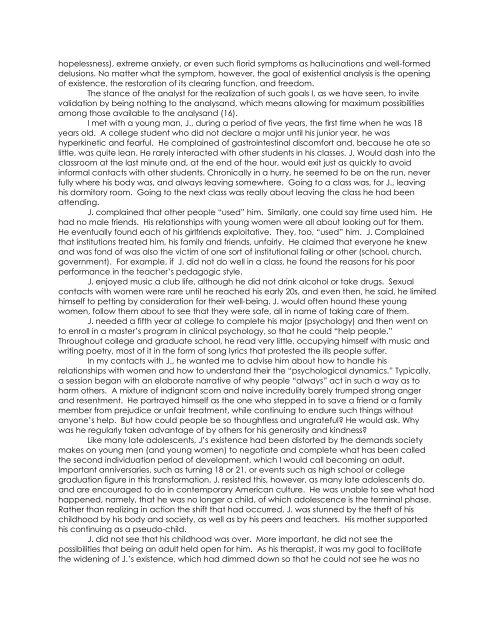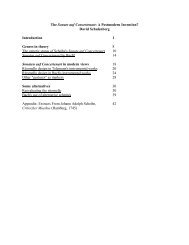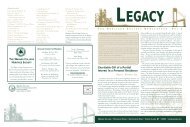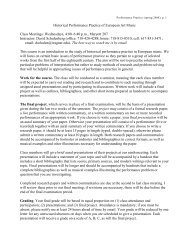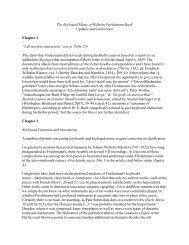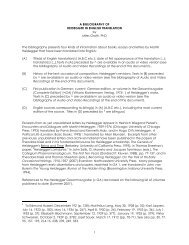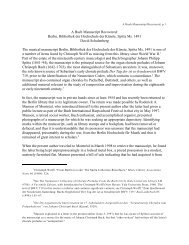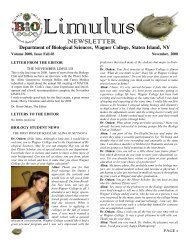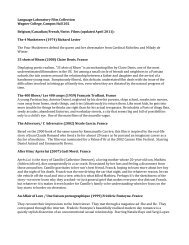SEVEN PAPERS ON EXISTENTIAL ANALYSIS ... - Wagner College
SEVEN PAPERS ON EXISTENTIAL ANALYSIS ... - Wagner College
SEVEN PAPERS ON EXISTENTIAL ANALYSIS ... - Wagner College
Create successful ePaper yourself
Turn your PDF publications into a flip-book with our unique Google optimized e-Paper software.
hopelessness), extreme anxiety, or even such florid symptoms as hallucinations and well-formed<br />
delusions. No matter what the symptom, however, the goal of existential analysis is the opening<br />
of existence, the restoration of its clearing function, and freedom.<br />
The stance of the analyst for the realization of such goals I, as we have seen, to invite<br />
validation by being nothing to the analysand, which means allowing for maximum possibilities<br />
among those available to the analysand (16).<br />
I met with a young man, J., during a period of five years, the first time when he was 18<br />
years old. A college student who did not declare a major until his junior year, he was<br />
hyperkinetic and fearful. He complained of gastrointestinal discomfort and, because he ate so<br />
little, was quite lean. He rarely interacted with other students in his classes. J. Would dash into the<br />
classroom at the last minute and, at the end of the hour, would exit just as quickly to avoid<br />
informal contacts with other students. Chronically in a hurry, he seemed to be on the run, never<br />
fully where his body was, and always leaving somewhere. Going to a class was, for J., leaving<br />
his dormitory room. Going to the next class was really about leaving the class he had been<br />
attending.<br />
J. complained that other people “used” him. Similarly, one could say time used him. He<br />
had no male friends. His relationships with young women were all about looking out for them.<br />
He eventually found each of his girlfriends exploitative. They, too, “used” him. J. Complained<br />
that institutions treated him, his family and friends, unfairly. He claimed that everyone he knew<br />
and was fond of was also the victim of one sort of institutional failing or other (school, church,<br />
government). For example, if J. did not do well in a class, he found the reasons for his poor<br />
performance in the teacher’s pedagogic style.<br />
J. enjoyed music a club life, although he did not drink alcohol or take drugs. Sexual<br />
contacts with women were rare until he reached his early 20s, and even then, he said, he limited<br />
himself to petting by consideration for their well-being. J. would often hound these young<br />
women, follow them about to see that they were safe, all in name of taking care of them.<br />
J. needed a fifth year at college to complete his major (psychology) and then went on<br />
to enroll in a master’s program in clinical psychology, so that he could “help people.”<br />
Throughout college and graduate school, he read very little, occupying himself with music and<br />
writing poetry, most of it in the form of song lyrics that protested the ills people suffer.<br />
In my contacts with J., he wanted me to advise him about how to handle his<br />
relationships with women and how to understand their the “psychological dynamics.” Typically,<br />
a session began with an elaborate narrative of why people “always” act in such a way as to<br />
harm others. A mixture of indignant scorn and naive incredulity barely trumped strong anger<br />
and resentment. He portrayed himself as the one who stepped in to save a friend or a family<br />
member from prejudice or unfair treatment, while continuing to endure such things without<br />
anyone’s help. But how could people be so thoughtless and ungrateful? He would ask. Why<br />
was he regularly taken advantage of by others for his generosity and kindness?<br />
Like many late adolescents, J’s existence had been distorted by the demands society<br />
makes on young men (and young women) to negotiate and complete what has been called<br />
the second individuation period of development, which I would call becoming an adult.<br />
Important anniversaries, such as turning 18 or 21, or events such as high school or college<br />
graduation figure in this transformation. J. resisted this, however, as many late adolescents do,<br />
and are encouraged to do in contemporary American culture. He was unable to see what had<br />
happened, namely, that he was no longer a child, of which adolescence is the terminal phase.<br />
Rather than realizing in action the shift that had occurred, J. was stunned by the theft of his<br />
childhood by his body and society, as well as by his peers and teachers. His mother supported<br />
his continuing as a pseudo-child.<br />
J. did not see that his childhood was over. More important, he did not see the<br />
possibilities that being an adult held open for him. As his therapist, it was my goal to facilitate<br />
the widening of J.’s existence, which had dimmed down so that he could not see he was no


